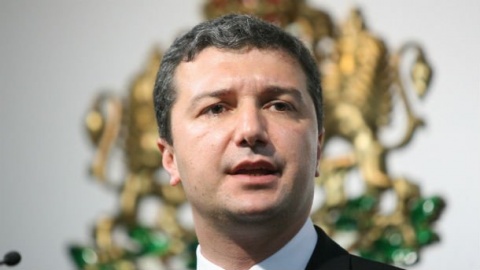
Bulgaria: The Cost of Resuscitating South Stream
Publication: Eurasia Daily Monitor Volume: 11 Issue: 65
By:

On April 4, the Bulgarian parliament passed on a first reading amendments to the energy law that would allow the Russian-led South Stream gas pipeline project to bypass European Union legislation. Disregarding a strong warning by the EU Commission, Bulgarian lawmakers voted to designate one of the biggest prospective gas pipelines in Europe as an interconnector, and not a pipeline—thus exempting South Stream from the Third Package on energy liberalization. This brazen legalistic maneuver is evidently a desperate attempt to rescue the troubled project after the EU suspended negotiations with Russia over a slew of legal problems and the subsequent annexation of Crimea (Mediapool.bg, April 4; Dnevnik.com, EurActiv.com, March 31).
The Bulgarian legislators went even further in their creativity—they introduced the term “sea gas pipelines” and voted to exempt such pipelines transporting gas from third countries from EU regulations. Therefore, “sea gas pipelines” would have a legal status of “not crossing European territory” until the point of connection with the national gas grid, well into the landmass. Evidently, the law will effectively pronounce Bulgaria’s territorial waters in the Black Sea not to be European territory (Mediapool.bg, April 4, EurActiv.com, March 31).
The vote passed 115 to 64, with 4 abstentions and the full backing of the ruling coalition—the Bulgarian Socialist Party (BSP) and its junior partner, the ethnic Turkish Movement for Rights and Freedoms (DPS). The ultra-nationalist Ataka party, whose leaders have recently transformed themselves into pro-Russian nationalists, also supported the decision. Most of the opposition Citizens for European Development of Bulgaria (GERB) party representatives voted against (BTA, Dnevnik.com, April 4).
The Ministry of Economy and Energy has endorsed the amendments and is expected to explain its decision to the European Commission. Minister of Energy Dragomir Stoynev has championed the South Stream project, claiming it would revive the economy and create 5,000 new jobs. “All ministers of the countries along the planned route of South Stream have united around the idea that construction of the pipeline should go uninterrupted because of its strategic importance for the whole of Europe,” Stoynev said on April 2 before the parliamentary energy session (ITAR-TASS, April 2; Standartnews.com, Publics.bg, April 3)
But Sabine Berger, spokesperson to Energy Commissioner Gunther Oettinger, informed that the Commission sent Stoynev a letter asking for clarifications regarding the draft legislation. Unnamed EU sources have allegedly told EurActiv that Bulgaria’s “cheating” over South Stream is likely to trigger a heavy infringement procedure, unless Sofia backtracks (EurActiv, March 31, April 4; Capital, April 6).
The sponsors of the law, Socialist members of parliament Yavor Kuyumdzhiev and Tasko Ermenkov, are not likely to withdraw it at the moment when the government is negotiating the terms of a loan from Gazprom to build the pipeline. The Bulgarian Energy Holding will borrow from Gazprom $630 million for a period of 22 years at an interest rate of 4.25 percent. But the total necessary funding is 3.5 billion euros ($4.8 billion) and 70 percent of it is supposed to come from bank loans, which have not been secured yet (Mediapool.bg, March 14).
In mid-April, the government is planning to announce the winners of the bid for the pipeline construction in Bulgaria. The local media has quoted unnamed government sources that Stroytransgas of Genady Timchenko, a close ally of Russian President Vladimir Putin and one of the persons on the United States’ sanctions list, has won the bid in a consortium with five Bulgarian companies. According to Mediapool, three of the Bulgarian companies in the winning consortium are insolvent and three are registered offshore. Nevertheless, the official address of the newly established consortium Gazproekt South is the same as the address of the Bulgarian Corporate Commercial Bank (CCB), which has close business relations with Russia’s Foreign Trade Bank (VTB). CCB is also connected to the businesses and media empire of Delyan Peevski, whose appointment as head of the National Security Council caused widespread protests in Bulgaria in 2013 (Mediapool.bg, March 14; Capital Weekly, March 29).
It is clear that the draft amendments to the energy law were prepared as a favor to Moscow—their justification contains the same arguments Russian diplomats and Gazprom officials are using when insisting on special treatment for South Stream. They claim that the project is an international pipeline that originates in a non-EU country and therefore should not be subjected to EU regulations. The Bulgarian government believes that the standoff between the West and Russia may temporarily disrupt construction of South Stream, but claims there is no long-term threat to the project (The Voice of Russia, April 3; https://www.parliament.bg/bg/bills/ID/14790).
Apparently, the Bulgarian Socialist government is unable to see that the South Stream gas pipeline project may be terminated. Such frantic attempts to resuscitate it will simply discredit Sofia in the eyes of Brussels and Washington. Speaking at the Atlantic Council in Washington, on April 3, US Special Envoy for International Energy Affairs Carlos Pascual presented the simple rational behind this conclusion: “The big energy companies (ENI, Electricite de France) will only proceed if the project is bankable, if they can go to the market place to raise finance. And the only way this project can become bankable is if the EU authorizes it—there is no bank to come in and finance a pipeline that the EU says cannot move through European territory,” Ambassador Pascual said. “The EU needs to see a very different competitive environment before this project moves forward” (atlanticcouncil.org, April 3).
Gazprom, however, refuses to separate its function as gas producer from the ownership of the pipeline, rejects reserving pipeline capacity for third party suppliers, and snubs the possibility of allowing a local independent regulator to determine the gas transfer fees. By catering to Moscow’s demands, the Socialist-led coalition in Sofia will simply create more problems for the embattled Bulgarian people and undermine the country’s standing in the EU.




